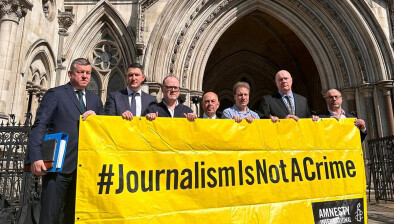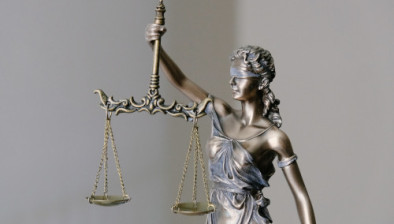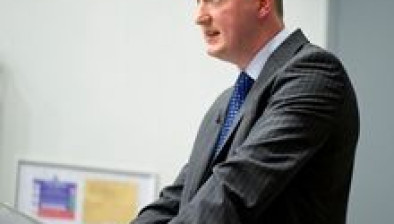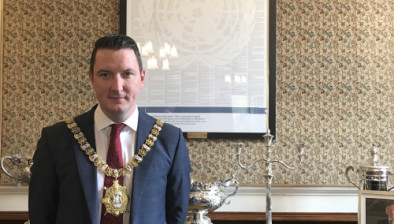Interview: John Finucane on being a lawyer and Lord Mayor, and how his father’s murder shaped his career
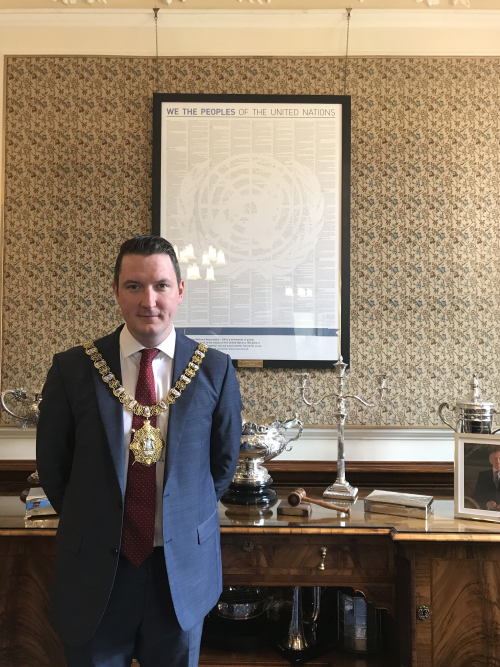
John Finucane
Irish Legal News recently caught up with the Lord Mayor of Belfast, John Finucane, to talk about his experience as a solicitor and advocate, and his hopes for the future of the city of Belfast.
Mr Finucane read Law with History at the University of Dundee and completed his Legal Practice Course in Newcastle, before working as a solicitor with human rights firm Kevin Winters and Company – now KRW Law – and then going on to start his own firm, Finucane Toner.
What made you decide to go to the University of Dundee?
I didn’t apply to any universities here; I think I wanted away from the North. Dundee was the obvious choice because, at that time, it was the only university that offered English and Northern Irish law, whereas the others only offered Scottish law.
I went to Dundee from 1998 to 2002 and really enjoyed it, possibly too much! As a city, it had a small community feel to it, so it wasn’t a city where you would feel as though you were getting swallowed up. Everything is quite centrally based around the campus. So, I enjoyed it. I play a lot of Gaelic football so was able to continue and play sport out there, meet new people, people I’m still in contact with now. Whenever I stood in the Westminster election in 2017, and then when I became a councillor, one of my lecturers, Professor Colin Reid, got in touch with me. So that was nice; I never thought he would have remembered me.
What made you decide to do the LPC?
When I came back from Dundee, I worked as a paralegal in Madden & Finucane, my father’s firm, which he started in 1979. After the law degree, I didn’t really know what a solicitor did, or what a barrister did – a law degree is very academically based, but I wanted to find out what the day-to-day was.
You can have a dictionary definition of what a solicitor is, but I wanted to know “what do you do minute by minute”. So, I came back and worked as a paralegal, to see, firstly if I wanted to do it, and secondly, would I prefer to be a solicitor or a barrister.
I decided that I wanted to be a solicitor, and I was probably like a lot of people – I wanted to get on that track to qualification, and it needed to be instant. So, I did the LPC in Newcastle, which I really enjoyed. By that stage, I knew what I wanted to do, so I was more focused on what was at the end of that year. I speak very highly of the LPC.
After the LPC, I came back to Belfast and was lucky enough to get a firm, Kevin Winters and Company, that had somebody on the English roll who was able to be my Master and see me over the line for my qualification. Once I qualified, I was thrown straight into the deep end of doing PACE and being in police stations, and on your feet in the Magistrates’ Court. I like that experience of being the first contact for a client, which is probably the main reason why I chose to be a solicitor rather than a barrister.
I’ve always enjoyed the advocacy side of the law, so I completed the Advanced Advocacy Course, run by the Institute of Professional Legal Studies and the Law Society of Northern Ireland. It’s a great course where they bring over North American trial lawyers and teach you all different things, and it’s a skill that’s rarely taught – even at CPD, you’re just expected to get up and speak. A really good advocate, whether it’s in a courtroom or whether it’s in politics, somebody who really captures your attention, and gets a message across, is really fascinating to watch.
Seven years ago, I made the decision to start up my own firm, which is Finucane Toner. Running your own firm presents its own challenges, but I’ve been very lucky with the partner that I’ve had, and we have an excellent staff where we are involved in some really fascinating stuff. So, it’s an exciting journey, branching out and doing a lot of different areas of law that are really interesting.
So you were starting your own firm and thinking of getting into politics at the same time, you like to keep busy!
I know, I don’t have enough plates to spin! With the nature of my father’s campaign, I’ve been exposed to politics and politicians from a very young age. My father was killed in 1989 when I was eight years old. From quite quickly after that, it would have been my normality growing up attending meetings in Leinster House with the Taoiseach or Tánaiste, meeting the NIO or Secretaries of State, meeting Prime Ministers, going to America and testifying at Congressional hearings and Senate hearings, being in the White House, going to the United Nations, dealing with NGOs as well, and so, it was obviously very personal, but as an experience, you see both the best of politics and the worst of politics, I think, and you can see what can come from both.
I probably was, in a way, destined to do law, but it took a long time for my own consciousness to wake up to that. People would have asked me when I was 18 if I was going to do law, and probably didn’t believe me when I said I didn’t know, but it took me some time to work that all out. So it may well be the same with politics.
In 2017, I was asked to put my name forward as the North Belfast candidate for the Westminster elections. It was at a time in politics when Stormont had just collapsed, there was the aftermath of the Brexit referendum the previous summer, and there were various different challenges around rights in this part of Ireland as well. I thought that if there was something that I felt I could add, then I should. The response in North Belfast was excellent, so I decided to run in the council elections.
There is an argument to say that the council has as much of an impact, if not more of an impact, on people’s daily lives than Stormont. What Belfast City Council is in charge of is enormous, and the city will be shaped coming from within this building over the next five, 10, 15 years. It’s a building and a role that I would never have identified with or had a connection with growing up.
In the ’80s and ’90s, I probably couldn’t have told you who the Mayor was – I would never have been in this building, and it was something that, whilst you walk past it every time you’re in the city centre, it didn’t feel as if it was mine. I think that that has changed, nothing to do with me, but it’s changed from the first Nationalist Mayor that was elected, and certainly from the first Republican Mayor that was elected, and you know, the make-up of the council over the past 10 or 20 years.
It’s the most diverse council I think we’ve ever had. I think that’s excellent, because it sort of counterbalances the lazy two-party narrative that you get here in the North, which I think is a bit of a stereotype. I also believe that no matter who you are in a city as big as Belfast, doing what Belfast is planning on doing, everybody should feel that there’s at least somebody in an elected body that either represents them, or comes close to representing them, so you feel as if your voice is being represented – that you have a stake in the city.
My mum was saying to me, whenever I was installed as Mayor, that she remembers my dad coming back home from attending council as a legal observer, and being frustrated at the way that the city was being run, or not run, and the lack of representation. It’s a completely different council now; it’s an entirely different city. It’s not green and orange – it’s diverse, it’s multicultural, it’s multi-ethnic, and that’s certainly something that I am promoting, and pushing, and celebrating as much as I can.
What do you hope to achieve as the Lord Mayor?
This is the first time that Sinn Féin have had the office of Lord Mayor for two years in a row, and a lot of the things that Deirdre Hargey rolled out were with a two-year timeframe – one of those being the Charter for the Citizens of Belfast. There are a number of events, especially around Human Rights Week in December that we’re looking to hold and really promote.
There’s a general feeling in Belfast, and beyond, that human rights aren’t privileges, you can’t just give them and take them from those who need them. I think we cannot shout loudly enough about human rights, and I think there is a groundswell in politics that people are no longer taking the excuse of “now is not the right time”, whether it’s same-sex marriage, whether it’s women’s reproductive rights, whether it’s Irish language rights, and then for broader constitutional questions on the issue of unity referendums and border polls. So I think it’s a really interesting time in politics here.
I am also trying to do as much as I can with regards the theme of reconciliation, both publicly and privately, and I suppose that started in my first day, welcoming Prince Charles to the city centre.
Environmentally, there are challenges for Belfast as a city, and I want to be raising that as much as possible. If people want to get out of their cars and walk to work or cycle to work, we have to make sure that the air quality is good enough. So, for example, the fleet of bin lorries need to be replaced, and we need to make sure that we can move away from diesel trucks to electric or hybrid vehicles. We need to make sure that on carbon emissions we’re setting an example. Then there are small fun things like a summer scheme competition for kids to create pieces of art to showcase Belfast, the environment, and challenges. I’m judging them, and they will go up in the Parlour, so I’m looking forward to getting a bit of vibrancy and colour there, as well as making sure that Belfast has a consciousness of its environmental responsibilities going forward.
A previous Mayor said to me, you only think you know your city. I’m born and bred in Belfast - I’ve lived in North Belfast, my father’s family is from West Belfast and my mother’s family is from East Belfast, so I’ve always felt I’ve had a good knowledge of Belfast – but there’s still so much going on that you wouldn’t be aware of unless you were in the role, so I’m very lucky.








